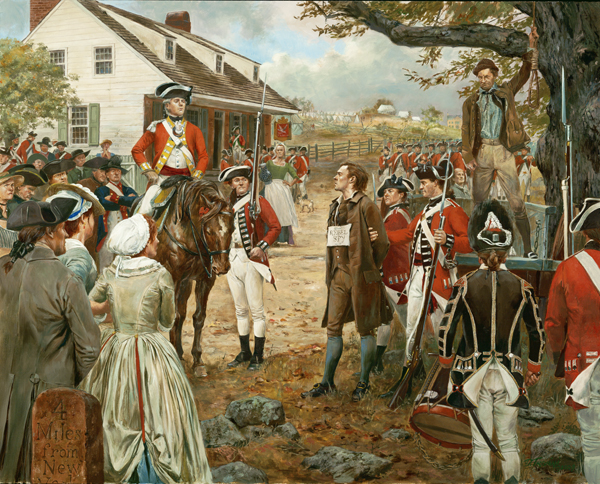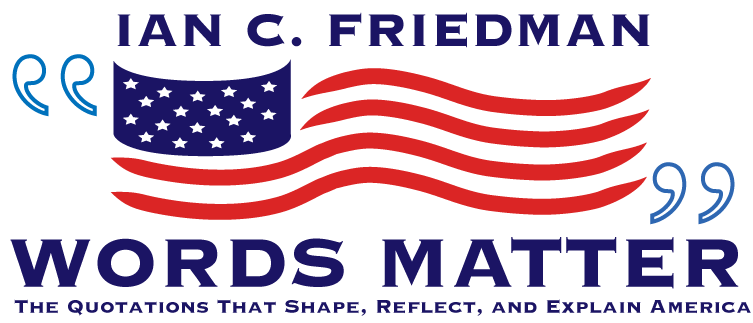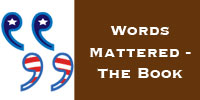“I only regret that I have but one life to lose for my country.” – Nathan Hale, September 22, 1776
 The words that powered the American Revolution came from luminaries such as Paine, Jefferson, and Franklin, but they were also contributed by others whose influence on history was more incidental and unexpected, but still enormously consequential. Among these people was Nathan Hale.
The words that powered the American Revolution came from luminaries such as Paine, Jefferson, and Franklin, but they were also contributed by others whose influence on history was more incidental and unexpected, but still enormously consequential. Among these people was Nathan Hale.
Hale was born and raised in Connecticut, the sixth of ten surviving siblings born to his Puritan parents who stressed a diligent work ethic and education. Hale enrolled at Yale University and graduated at the age of 18. After a short time working as a teacher, Hale joined a local militia organized in the fight for American independence from Great Britain. Though he had not engaged in actual battle, Hale distinguished himself in his duties and was soon recruited by an aide of General George Washington to serve as a spy in and around New York City. Within a few weeks Hale was captured by British soldiers and admitted his role as a spy when incriminating documents were found in his possession. The next day, September 22, 1776, Hale was brought to a British artillery park for his execution.
Accounts of what exactly Hale said moments before his hanging have varied significantly. Frederick Mackenzie, a British captain who witnessed the event, noted in his diary that Hale, “behaved with great composure and resolution, saying he thought it the duty of every good officer, to obey any orders given him by his Commander-in-Chief; and desired the spectators to be at all times prepared to meet death in whatever shape it might appear.” Others have noted variations on a similar theme, but it is the version popularized by William Hull, an American colonial officer who heard of Hale’s final words after speaking with a British soldier who was there at the time. According to Hull, Hale approached the hangman’s noose with a spirit of steadfast defiance and strength that increasingly was defining the American movement for independence, saying, “I only regret that I have but one life to lose for my country.”
Hale remains among the most celebrated martyrs and heroes of the American Revolution, but his spirit of dedication was shared by many other individuals and diverse groups of people whose contributions to the creation of the United States of America was indispensable. Chief among these groups were people of African descent. Heeding concerns among many southerners that allowing blacks to gain military experience and access to weapons may lead to slave insurrections, Washington halted enlistment of new black soldiers soon after taking command of the Continental Army. But their bravery and skill in the field and the need for their contributions led Washington to quickly ask Congress to allow those blacks who had already served to reenlist and continue to fight for American independence together with white soldiers. Congress approved the request. Eventually one–fifth of American troops in the North would be black soldiers, many of them proudly possessing newly adopted last names such as Liberty and Freeman. It would be almost two hundred years before the United States would again have a military force so racially integrated.
Women also provided vital support for the often ragged American fighters. Although most women directly involved in battle were nurses or cooks, many others were “Molly Pitchers,” a nickname applied to those who joined their husbands in combat on the front lines and often brought pitchers of water to exhausted American combatants.
Individuals from other countries also gave valuable assistance to the American cause. Attracted by the political ideals and perceived glory of the American Revolution, people such as German Friedrich von Steuben and Poles Tadeusz Kosciusko and Casimir Pulaski volunteered their services to the Continental Army. Von Steuben created an intensive training program for one hundred officers, who in turn provided critically needed instruction and discipline for the struggling American fighting forces. Kosciusko’s engineering knowledge greatly improved the Americans’ ability to fortify their defenses, and Pulaski’s development and leadership of the American cavalry aided the Americans in many battles and eventually cost him his life.
The most renowned foreign volunteer of the American Revolution was the French nobleman Marie Joseph du Motier, better known as the Marquis de Lafayette. The twenty-year-old came to America in 1777 and quickly proved his value as a leader in battle, as well as in the halls of negotiation when he helped to persuade the French government to consider aiding the Americans.
French assistance became a reality following the surprising American victory at the Battle of Saratoga in October 1777. Finally convinced that the American Revolution could succeed, the French entered into a full military alliance with the infant United States of America. French money and material enabled the Americans to extend the war, depleting the resources of the British and diminishing their patience for continued participation in the conflict.
Domestic discontent and fear of a potential stalemate grew in Great Britain, while in America the growing frustration among British troops became increasingly evident. In a situation that parallels the American experience in Vietnam almost two centuries later, the British were often unable to distinguish friend from foe in the countryside; therefore, they engaged in widespread plundering of local homes and farms, further igniting the armed resistance of locals. The British were winning most of the battles, but they were not winning the war.




